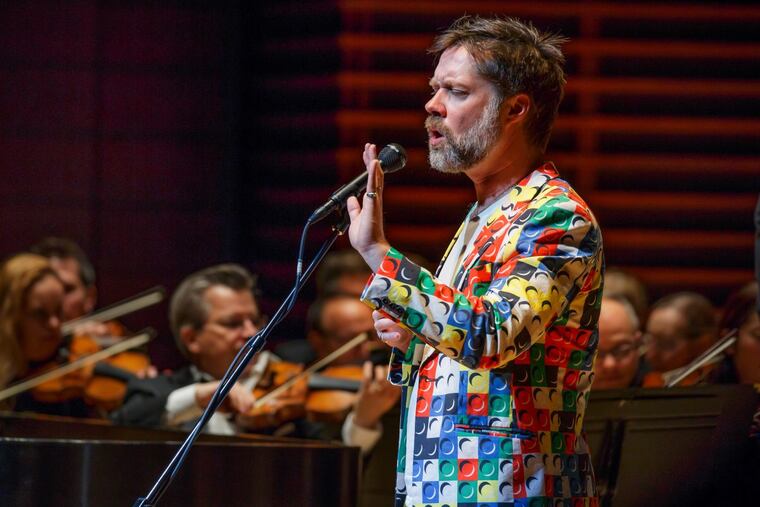Getting personal with Rufus Wainwright and the Philly Pops
Against orchestrations, at the keyboard and with his voice alone, Wainwright covered some trenchant emotional territory.

Is Rufus Wainwright a one-man retort to a bruised and weary world? It's a lot for anyone to take on right now, but Friday night, with the Philly Pops at the Kimmel Center, he seemed up to the task.
For more than two hours, in tunes alone, at the keyboard, or backed by some rich orchestrations led by conductor Michael Krajewski, the singer-songwriter negotiated a tricky high-wire act. He seemed deeply disturbed by the outside world – "vote in the midterms," he urged the audience. And yet, the power of Wainwright is in his ability to light interiors – highly personal emotional and musical worlds to which one would be happy to escape.
The concert, one night only, was a departure for the Philly Pops, which more typically spends its time strumming the chords of nostalgia. One concert later this season looks back to Led Zeppelin, the Rolling Stones, and Queen, another to Sinatra.
But here was a living artist still producing work, and the crowd Wainwright drew in around him at Verizon Hall was younger and hipper than at the typical Pops audience. You don't have to be gay to get Wainwright, but it sure doesn't hurt. The political is personal, and often, in comments between songs and in the songs themselves, Wainwright gave off a sense of struggle.
It's that confessorial aura, of course, that makes the singer. The affinity with Judy Garland, if it wasn't obvious earlier, was made explicit when Wainwright plopped down on the stage floor in an "Over the Rainbow" that tracked considerably more gentle for the subtle orchestrations in a version by Jon Charles.
What's true and honest about the voice itself is that Wainwright deploys no tricks. The many affectations that have crept into pop-singer expressive parlance – the Disney-fication of singers – are not to be found here. His sound is straightforward, and emotion stems almost entirely from the speed of his air, the intensity and relaxing of the muscle, and a fine sense of vibrato.
"Going to a Town," with its repeated line "I'm so tired of America," started in the orchestral sound universe of Copland's Appalachian Spring, and was filled not with anger, but a sweet aching.
Wainwright has a good ear for the relationship between harmonic changes and the emotional charge they let off, and his pacing is astute. "This Love Affair" – "Let's get depressed," he said before starting – unspooled in a moody, Chopin-esque exposition. In the hymnlike "The Maker Makes" with just Wainwright and his piano, the world disappeared, leaving the listener alone with a spare bit of poetry and the dusky voice.
Catharsis comes in many forms. When the encore came, Leonard Cohen's "Hallelujah," the concert arrived at a nexus of layered meanings. The Philadelphia Gay Men's Chorus backed up the singer on the one word, Hallelujah, in the group's only appearance of the night as the stage glowed in rainbow lighting. Insiders might have been thinking about Wainwright's daughter, whose other parents are Cohen's daughter and Wainwright's husband. For artists as for the rest of us, the personal is inescapably political.